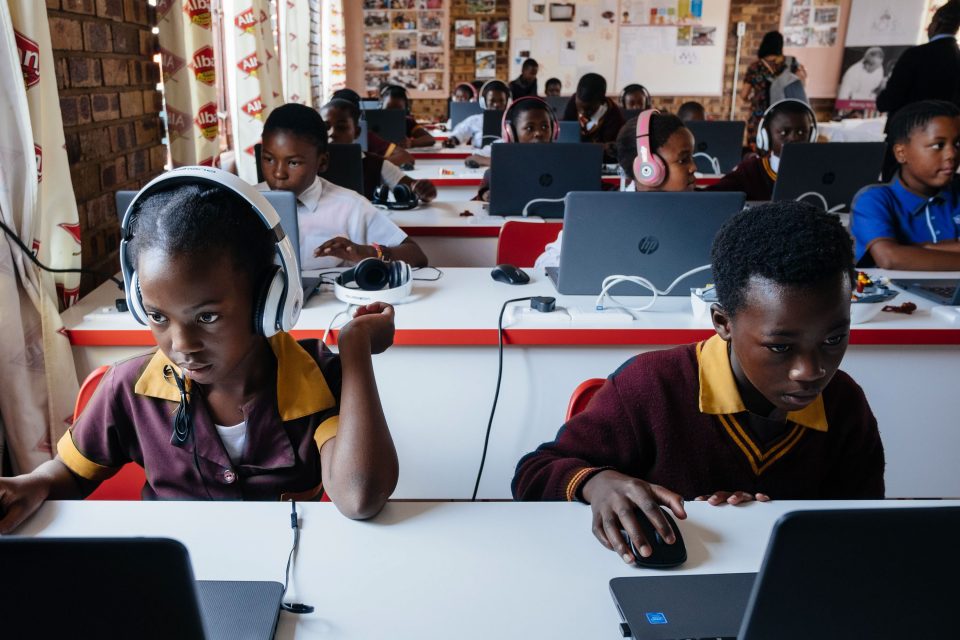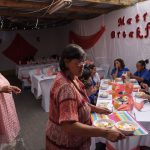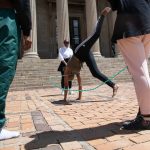Soweto computer lab gives life to dreams
ACFS Community Education in Meadowlands provides daily meals and after-school support to children, and now has a computer lab. Parents can learn, too, and benefit from the vegetable garden.
Author:
10 March 2020

“Poverty stops children from dreaming,” says Bertha Magoge, 49, the executive director of the African Children’s Feeding Scheme (ACFS). For her, it is a priority to provide an opportunity for pupils to “think of a different reality”.
The ACFS, along with the Vodacom Foundation, recently launched a computer lab for grades 5 to 12 learners in Meadowlands, Soweto. The lab is at a centre first used by the ACFS’s Community Education arm to give children a daily meal and provide an after-school education programme.
Volunteers at the computer centre teach basic computer literacy and help pupils with their homework. From 2pm to 4.30pm on school days, learners from grades 5 to 12 can attend a computer skills lesson and receive general academic support.
Adults attend morning classes on beading, needlework and sewing, and other craft and artisanal skills. “We believe those are skills they can use to get an income,” says Magoge.

Bontle Mokoena, 12, from Tsietsi Mashinini Primary School, says, “We learn more things [at the lab] that we don’t get to learn at school.” She enjoys spelling and dreams of becoming a doctor.
Tinyiko Nkuna, 11, attends Tswelelang Higher Primary School with Kamohelo Moloi, 12, and Thando Xulu, 12. Tinyiko says the lab prepares learners for their future careers. She wants to be a lawyer. Kamohelo is also enthusiastic about the centre. “We play games, sing and we study.” Thando says, “The [computer lab] assists a lot in helping us to pass.” The grade 6 pupil encourages other learners to join for studying purposes. None of the learners have computers at their school.

Lab launch
Although the lab launched officially in February this year, the computer skills lessons started in 2019. Launching it in 2020, Magoge says, was to allow the children to better understand the programme, give parents time to appreciate what their children were learning and provide an opportunity for teachers in schools to see the benefits of the project.
Those attending the launch gathered in a tent opposite the vegetable garden, with parents and learners singing and enjoying the choir conducted by one of the learners who attends the centre. Learners and parents cried, laughed, danced and ululated. And the computer lab doubled as a gallery for the day, exhibiting the bags and colourful beaded bracelets and necklaces created during the adult skills development classes.
Related article:
The feeding scheme ran before the lab was launched. Magoge says the non-governmental organisation supports children through nutrition, health and education. It supports parents, too. “Each family gets a portion of the land [outside the education centre], three or four beds that they work on and they grow food … ACFS [helps] parents [to] ensure that children get access to fresh vegetables on a daily basis. In return, [the parents] assist us to cater for our kitchen’s needs. So, that’s their way of contributing to the sustainability of the centre.”
The aim of the lab is twofold, says Magoge, “to support children in their education outcome trajectory so that they do better at school” and to provide a safe environment where they can get additional input into how to work on a computer, access the internet and develop literacy skills.
The lab has 25 computers and 1 000 registered children. Magoge admits to the centre’s limited capacity. “We select those [who] need the most help, 120 learners from grade 5 to 12.” Volunteers assist matriculants with their university applications.

Volunteers make a difference
Two volunteers manage the after-school programme, Nhlakanipho Langa, 22, and Lucky Ndzunga, 26. Ndzunga says the children lack access to computers or phones to surf the internet. “But now, they have a computer centre and free internet that Vodacom is giving every month.”
Their role as volunteers, adds Ndzungu, is to teach children to understand technology. “In the beginning, the children didn’t know how to use a computer [or] how to type. They didn’t know what a mouse is.” Now they know the difference between a left and right click on a mouse and are able to search the internet.
Ndzunga says illiteracy levels are high, but credits the educational software they use for helping those who attend the centre to read and write. To complete tasks, learners work in teams and are sometimes encouraged to become competitive. The volunteers use chocolate to motivate the learners.
Related article:
ACFS Community Education works with four schools. Matric pupils use the lab to access previous exam papers and watch videos that explain subjects such as maths. “In the videos, you can change language to your home language,” says Ndzunga.
The volunteers have a strategy for selecting learners for the programme. “We want the learners that are struggling. In selecting, we use their outcome reports to see which learners need help the most in different subjects.”
The ACFS also undertakes home visits to identify families in need of support, which they then provide for parents as well as caregivers.

Community involvement
Kedibone Mutauhatshindi, 45, is a volunteer parent. She works in the vegetable garden, helps cook the children’s daily meal and for events held at the centre, and assists with dishing up and distributing the daily meal to the pupils. Mutauhatshindi’s 13-year-old son, Kwazi Ngwenya, attends the educational-support programme. He failed in the first and second terms, but started doing well at school after joining the after-school programme last year. “I doubted if my child was going to pass, but he passed … I am so happy.”
Mutauhatshindi does not have a computer at home, so the lab is also a help to unemployed parents like her who need to make copies of their CVs or print things out. The centre does not charge for these. “As the community, we are really fortunate … because whatever it is that has to do with computers and internet, the volunteers help us.”
As a parent depending on a social grant to survive, Mutauhatshindi says being a volunteer helps. “I am able to get food parcels every end of the month.”
Magoge is adamant that by taking the time to focus on what is being invested in these children, we will all have a better future.



